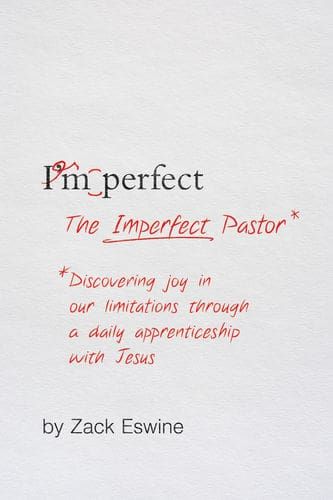The Imperfect Pastor

When I first read Sensing Jesus by Zack Eswine, I liked it so much that I bought a paper copy to go with the Kindle version. It’s a good thing, too, because my wife has claimed rights to the paperback and has marked it up. It’s a book that I planned to read and re-read. It’s a book I recommended that every pastor read.

No more. I now recommend his new book The Imperfect Pastor, an updated and shortened version of Sensing Jesus. It addresses the same issue: our desire to do large things in famous ways as fast as we can. “When I started, I did not know that a pastoral vocation in Jesus would limit me, slow me down, and painfully undo the misguided mentoring of my life,” Eswine writes. “Now, I know that my success and joy as a pastor depend on this. So does yours.”
The Imperfect Pastor feels like a chronology of my temptations as a pastor. Part one begins with our calling. Desire is good, but it can be twisted by evil, especially as we drink from the “stale waters of celebrity, consumerism, and immediate gratification.” We desire to do great things for God, but our definition of greatness is often different than God’s. “Almost anything in life that truly matters will require you to do small, mostly overlooked things , over a long period of time with him.”
Eswine reminds us that pastoral ministry is creaturely. We pastor as humans; “greatness, even in ministry, cannot escape humanity.” We must find our place with ordinary people in ordinary places, and love the people right in front of us. We must learn to serve within ministries that are often mundane, invisible, uncontrollable, and unfinished. When we give our time to “unknown, broken people in out-of-the-way places overlooked by the world, but delighted in by him,” we are following the example of Jesus.
Part two tackles our temptations:
- to be everywhere for everyone, rather than doing a long, small work in an unknown place;
- to try to fix everything, rather than knowing that there are things we can neither control nor fix;
- to think we know it all, rather than understanding the limits of our knowledge;
- to accomplish things quickly, rather than learning patience.
Part three calls us to reshape our inner life by cultivating a quiet heart, being attentive to God’s graces right in front of us, and finding our pace. Part four invites us to reshape the work we do: to visit the sick, care for the sinner, know and love the place to which we’re called, lead biblically rather than efficiently, and “do the great work…right in front of you with the persons and places that his providence has granted you.”
“Pause here ,” writes Eswine. “Read that last sentence again if you need to. Prayerfully slow down for this.” Phrases like this litter the book. It’s not just a literary device; it’s the very tenor of the book. Slow down. Meditate. Consider what’s written. Ask God to help you. This is not a book to speed-read; it’s a book to savor and re-read.
I’ve read this book in one form or another at least three times now, and I’m not done yet. The Imperfect Pastor is an exposé on the temptations that pastors face, and a reminder of what real ministry looks like. It’s one of the best pastoral theology books I’ve read, and one that’s worth rumination, not just reading. I hope you’ll get it.
More from Crossway | Amazon.com | WTS Books






